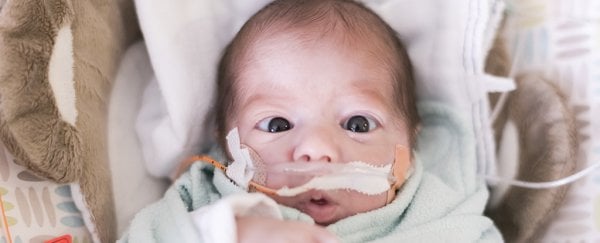As part of the world’s longest-running analysis of extremely low birth weight (ELBW) babies born prematurely, scientists have discovered that the genes of male ELBW babies age more quickly than those of full-term male newborns.
We’re talking about biological aging or senescence here: these men aren’t suddenly rushing through their birthdays at an accelerated rate, but rather hundreds of key genes in their bodies have a greater degree of the kind of chemical editing that occurs naturally over time.
The study results indicated them to be an average of 4.6 years ‘older’ by their 30s than boys with normal birth weight born at the same time.
The difference wasn’t found in female ELBW babies, the researchers report, matching up with previous research that has shown premature male babies may be more sensitive to prenatal stress than premature females.
“Although it is unclear why accelerated biological aging is seen in the ELBW men, this suggests that prenatal exposures play an important role in aging,” says physician and neuroscientist Ryan Van Lieshout, from McMaster University in Canada.
ELBW babies are those weighing less than 1 kg (2.2 pounds) at birth – a little under a third of the normal average weight for babies carried to term. In this particular piece of research, the subjects were ELBW babies born between 1977 and 1982; they have been regularly followed up on by scientists since.
There’s no fixed formula for measuring biological aging, but a variety of signals in the body can be assessed as a guide, including the length of telomeres (the caps at the end of chromosomes).
In this study, an epigenetic clock was used: a biochemical test that takes into account the methylation levels of one’s DNA. This methylation is a natural process by which certain molecules called methyl groups get added to our DNA fragments, which in turn can change how the genes are read.
Epigenetic clock measurements are thought to give a good indication of one’s biological age, and may even flag disease risks ahead of time.
The team looked at the genes of 92 people aged 30-35 – of those, 45 had been ELBW babies and 47 were at a normal weight when born. The analysis was controlled for chronic health problems and sensory impairments.
“This certainly highlights the need to monitor the health of preterm survivors across their lifespan, and more research needs to be done,” says Van Lieshout. “This also emphasizes the need to forewarn the ELBW men and promote healthy aging so they may proactively mitigate these risks.”
Plenty of different factors affect every one of us in terms of how fast we age biologically: all the good stuff like getting enough sleep and exercise, eating a balanced diet, not smoking, and keeping strong social bonds around us can help reduce biological aging rates.
The next question is why this extra aging happens in ELBW baby boys and not the girls, and whether it’s connected to what happens before birth. The way that the boys handle the hospital neonatal intensive care unit after they’re born could also be having an influence, the researchers say.
Once a better understanding of what’s going on has been established, it should give experts some ideas about how to limit this accelerated biological aging – perhaps by increasing awareness of the need for healthy living from an early age, or by changing some of the practices and procedures in the neonatal ward.
“These changes could have important implications in terms of premature aging, disease susceptibility, and mortality, and highlight the need for monitoring and health promotion in preterm survivors across the life span,” conclude the researchers in their paper.
The research has been published in Pediatrics.



